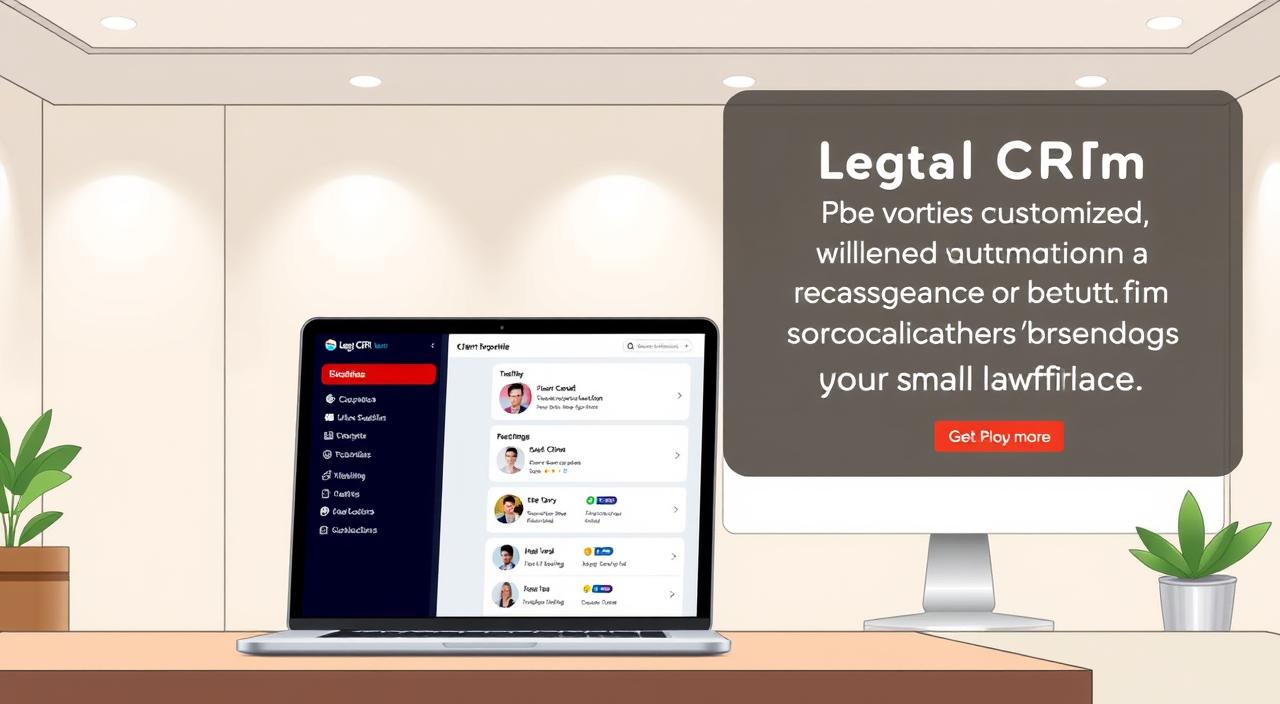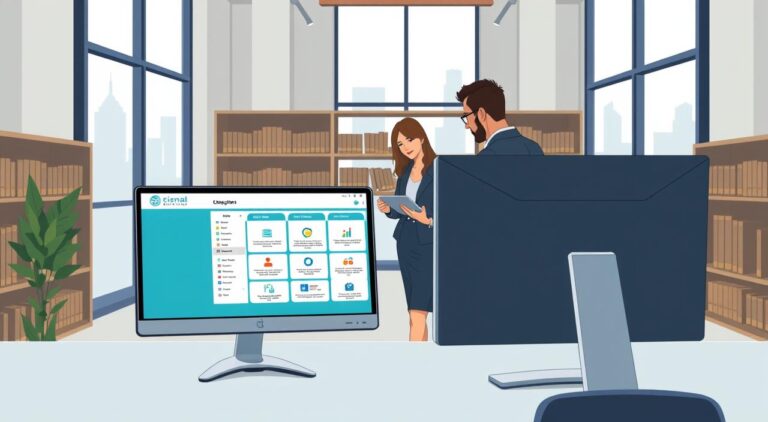Top Legal CRM Software for Small US Firms
In today’s competitive legal landscape, small law firms in the US need efficient systems to manage client relationships and streamline operations. The right CRM software is the answer to this challenge.
According to an Ackert survey, 78% of law firms use a CRM system, and about 84% saw an increase in their overall work efficiency using legal technology. This comprehensive guide will analyze the top CRM software options specifically designed for small law firms in the United States.
We’ll examine essential features, pricing structures, and the specific benefits each platform offers to legal professionals working in small practice settings.
Key Takeaways
- Efficient client relationship management is crucial for small law firms.
- CRM software can significantly improve work efficiency.
- The right CRM solution is necessary for competitive small firms.
- Top CRM software options offer various features and pricing structures.
- Implementing CRM software can drive growth for small law practices.
Understanding the Value of CRM for Small Law Firms
Client relationships are at the heart of any law firm’s success, and CRM software plays a vital role in nurturing these relationships. In the legal profession, building trust and maintaining strong connections with clients is crucial for generating repeat business and referrals.
Why Client Relationship Management Matters in Legal Practice
Effective client relationship management is essential for small law firms to differentiate themselves in a competitive market. By leveraging CRM law platforms, attorneys can ensure that client interactions are personalized and that all relevant information is readily available.
- Modern CRM software eliminates the inefficiencies of traditional methods like spreadsheets, paper files, and disconnected email systems.
- By centralizing client information, CRM software creates a single source of truth that reduces errors and miscommunications.
How CRM Software Transforms Law Firm Operations
Management software designed for law firms can significantly enhance operational efficiency. By automating routine tasks and providing insights into client interactions, CRM software allows attorneys to focus on high-value tasks.
- The automation capabilities in legal management software reduce non-billable administrative time, allowing attorneys to focus more hours on revenue-generating activities.
- Software designed specifically for law firms includes industry-specific features like conflict checking, intake workflows, and referral source tracking.
By adopting CRM software, small law firms can gain a competitive edge and improve their overall client satisfaction. The analytical capabilities of CRM law platforms provide valuable insights that can inform marketing strategies and client engagement initiatives.
What is Legal CRM Software and Why Your Firm Needs It

Legal CRM software has emerged as a vital tool for small law practices seeking to improve client engagement and optimize their limited resources. At its core, a Legal CRM is designed to organize interactions with both potential and existing clients, providing a centralized database to compile all customer information in one place.
This includes contact details, past communications, orders, and payments, making it easier to manage client relationships through features like synchronized calendars, mass email campaigns, and integrated tools such as chatbots or portals.
Core Functions of Legal CRM Systems
The core functions of Legal CRM systems are designed to streamline client management processes. These include:
- Centralized client data management
- Automated follow-up mechanisms to ensure prospective clients are not overlooked
- Personalized communication at scale through segmentation and targeting
- Data-driven insights to inform strategic decisions about practice areas and marketing channels
By leveraging these functions, small law firms can significantly enhance their operational efficiency and client engagement strategies.
Key Benefits for Small Law Practices
For small law practices, the benefits of implementing a Legal CRM are multifaceted. These systems effectively multiply the capabilities of limited administrative staff through automation, ensuring that prospective clients don’t fall through the cracks during busy periods. This maximizes the return on marketing investments and elevates the firm’s perceived professionalism and service quality.
Moreover, Legal CRM systems enable small law firms to maintain client relationships at scale, a feat that would otherwise be impossible with limited resources. By leveraging data-driven insights, these firms can make more strategic decisions about which legal practice areas to develop and which marketing channels deliver the best return, thereby optimizing their limited marketing budgets.
Essential Features to Look for in the Best Legal CRM Software for Small Law Firms US
The right Legal CRM software can transform your small law firm’s operations, but you need to know what to look for. Automating your client intake process is crucial as it improves organization and workflow, reduces data entry, and enhances client experience. It also allows for better tracking and analysis of data. When evaluating Legal CRM software, several key features should be at the forefront of your decision-making process.

Client Intake Automation
Client intake automation is a vital feature that streamlines the process of onboarding new clients. With the best Legal CRM software, you can generate online forms, create appointments, and receive documents electronically. This automation not only reduces manual data entry but also ensures that client information is accurately captured and stored. By automating these tasks, small law firms can significantly improve their operational efficiency.
Case Management Capabilities
Effective case management is critical for law firms to track the progress of cases, manage deadlines, and communicate with clients. The ideal Legal CRM software should offer robust case management capabilities, allowing you to centralize case information, set reminders, and collaborate with team members seamlessly. This feature ensures that all relevant details are readily accessible, enhancing overall case management.
Document Management and Storage
Document management is another essential feature to consider. The Legal CRM software should provide secure, centralized storage for client documents and case files. This not only helps in maintaining organization but also ensures compliance with data protection regulations. Look for software that offers easy document retrieval, version control, and secure sharing options to facilitate collaboration and client communication.
Security and Compliance Features
Given the sensitive nature of legal data, it’s crucial to make sure that the Legal CRM software you choose offers robust security and compliance features. This includes bank-grade encryption for data both in transit and at rest, role-based access controls, and compliance with industry standards like SOC 2. Regular security audits and detailed audit logs are also important for maintaining security and meeting regulatory requirements. When evaluating software law firms use, consider these security features to protect client data and maintain trust.
By focusing on these essential features, small law firms in the US can select a Legal CRM software that meets their specific needs, enhancing their operational efficiency and client service. The legal industry demands high standards of data security and compliance, and the right CRM software will help firms achieve these standards while improving overall performance.
Lawmatics: Purpose-Built Legal CRM
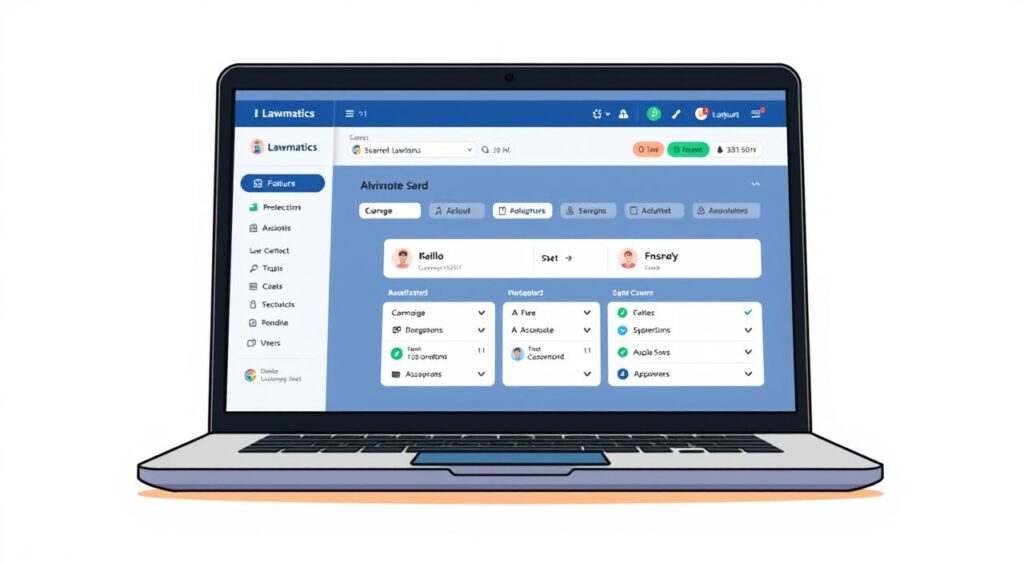
Lawmatics offers a comprehensive CRM platform designed specifically for the legal industry, addressing the complexities of client management. This legal-specific CRM is tailored to help lawyers and law firms manage contacts, calendars, tasks, emails, and documents in one place.
Overview
Lawmatics is designed to improve client relationships and streamline law firm operations. It includes features such as client intake forms, matter management, document assembly, billing, and time tracking software.
Pricing
Pricing for Lawmatics starts at $149 per user per month for the Basic plan, going up to $1,149 for the Premium plan.
Key Features
The platform boasts robust conflict checking and integrations with accounting software. Lawmatics enhances client communication by keeping them informed about case status and timelines, thus avoiding potential issues.
Pros
Automated tools help save money through higher marketing conversion rates, as firms only invest in the most effective channels. This leads to more clients and revenue for the law firm.
Cons
Some drawbacks include a higher price point that may be challenging for very small practices or solo attorneys, and the comprehensive feature set can be overwhelming for a law firm just beginning with CRM implementation.
Clio: Comprehensive Practice Management with CRM

Clio stands out as a leading legal CRM by providing a holistic approach to practice management. It is designed to streamline the technology needed by law firms, replacing multiple systems with a single, comprehensive platform.
Overview
Clio is a cloud-based practice management software that integrates CRM capabilities, allowing law firms to manage their caseloads efficiently. It includes features such as document management, case management, and accounting software, making it a one-stop solution for legal practices.
Pricing
Clio offers several pricing plans, starting from $39/month up to $129/month for the complete package, catering to various sizes and needs of law firms.
Key Features
The key features of Clio include client intake automation, case management capabilities, and document management. These features are designed to enhance the efficiency of legal practices and improve client relationship management.
Pros
Clio’s comprehensive nature allows it to streamline law firm operations, making it easier to manage caseloads and client relationships. Its robust feature set is a significant advantage for law firms looking for an all-in-one solution.
Cons
Some of the drawbacks include limited advanced marketing automation features compared to dedicated CRM systems, and the comprehensive nature can be overwhelming for solo practitioners. Additionally, custom reporting may require additional setup or third-party integrations.
Zoho CRM: Customizable Solution for Legal Teams

For legal teams seeking a CRM that adapts to their unique needs, Zoho CRM offers a customizable platform. Zoho CRM is designed to cater to businesses across various industries, including law firms, providing tools to manage client relationships, track leads, automate workflows, and analyze sales data.
Overview
Zoho CRM allows law firms to tailor the software to their specific needs with its customizable modules and powerful automation capabilities. The platform integrates with other Zoho applications, such as Zoho Books for accounting and Zoho Desk for customer support, creating a seamless ecosystem for managing client interactions.
Pricing
Zoho CRM’s pricing begins at $12/user per month for the Standard package and goes up to $45 for the Ultimate package.
Key Features
The key features of Zoho CRM include customizable modules, automation capabilities, and integration with other Zoho apps. These features enable law firms to streamline their operations and enhance client relationship management.
Pros
The pros of using Zoho CRM for law firms include its high customizability and seamless integration with other Zoho applications. These benefits contribute to improved operational efficiency and enhanced client management.
Cons
Some of the cons include the lack of certain legal-specific features like conflict checking and trust accounting. Additionally, the extensive customization options can create a steeper learning curve, and some users find the interface dated compared to newer CRM platforms.
Law Ruler: Specialized Legal Intake and CRM

Law Ruler is revolutionizing the way law firms manage client intake and CRM processes. With its comprehensive features and seamless integrations, Law Ruler is designed to enhance productivity and maximize conversion rates for legal professionals.
Overview
Law Ruler is a specialized CRM software tailored for law firms, focusing on streamlining lead management and the client intake process. It offers a range of features to improve productivity and conversion rates, making it an ideal solution for law professionals seeking to optimize their CRM processes.
Pricing
Law Ruler’s pricing starts at $169 for the Pro plan and $212 for the Premium plan. For the Enterprise plan, pricing is available upon contacting their sales team, allowing for customized solutions for larger firms.
Key Features
The software integrates with various marketing platforms, call-tracking systems, and case management tools, providing a centralized hub for managing leads, tracking communication, and automating follow-ups. Key features include lead management, client intake automation, and advanced reporting capabilities.
Pros
Law Ruler offers several advantages, including enhanced productivity through streamlined processes and improved conversion rates due to its advanced lead management features. Its ability to integrate with other tools and platforms makes it a versatile solution for law firms.
Cons
Some drawbacks include a higher price point compared to general-purpose CRM solutions and the potential need for technical assistance for advanced customization. Additionally, the interface could be more intuitive, as reported by some users.
HubSpot: Marketing-Focused CRM for Law Firms

HubSpot’s CRM software is designed to cater to various industries, including the legal sector, providing a centralized system for managing client relationships. Law firms can leverage HubSpot’s CRM to organize and track client interactions, automate email campaigns, manage documents, and gain valuable insights through analytics and reporting.
Overview
HubSpot’s CRM offers a user-friendly interface and integrates seamlessly with its suite of marketing, sales, and customer service tools. This integration enables law firms to streamline their operations and improve client management. With HubSpot, law firms can track leads, automate marketing processes, and analyze client interactions in one platform.
Pricing
HubSpot provides various pricing plans, including a free CRM option with basic features. Additional features are available starting at $18 per month for the Starter plan, scaling up to $3600 for the Enterprise plan.
Key Features
The key features of HubSpot’s CRM include contact management, sales pipeline tracking, and marketing automation. It also offers advanced analytics and reporting tools, enabling law firms to make data-driven decisions. Furthermore, HubSpot’s CRM integrates with other tools and software, enhancing its functionality and adaptability.
Pros
One of the main advantages of HubSpot’s CRM is its ease of use and intuitive interface. It also offers a wide range of tools and features that can be customized to suit the needs of law firms. Additionally, HubSpot’s CRM provides scalable pricing plans, making it accessible to firms of various sizes.
Cons
While HubSpot’s CRM is versatile, it lacks legal-specific features such as conflict checking and matter management. Higher-tier plans can become expensive for small law firms. Moreover, law firms may need to integrate HubSpot with practice management software for a complete workflow, which can add complexity.
SalesForce: Enterprise-Grade CRM Adaptable for Legal

For law firms seeking a comprehensive CRM, SalesForce offers a versatile platform that can be tailored to their unique needs. Although not specifically designed for the legal industry, SalesForce’s robust features and customization capabilities make it a viable option for managing client relationships and workflow.
Overview
SalesForce is a cloud-based CRM that provides a wide range of tools for contact management, lead tracking, and marketing automation. Its adaptability allows law firms to customize the software to fit their specific requirements, making it a valuable asset for client management and workflow optimization.
Pricing
The pricing for SalesForce varies depending on the chosen solutions, starting at $25 and going up to $1,250. This range allows law firms to select a plan that aligns with their budget and needs.
Key Features
SalesForce offers several key features beneficial for law firms, including contact management, lead tracking, and marketing automation. Additionally, its ability to integrate with various third-party apps enhances its functionality, allowing for a more streamlined workflow.
Pros
The pros of using SalesForce for law firms include its comprehensive feature set, customization capabilities, and scalability. These advantages enable law firms to effectively manage their client relationships and adapt the CRM as their practice grows.
Cons
Some drawbacks to consider are the significant investment required for implementation and customization, a steeper learning curve compared to legal-specific alternatives, and higher pricing that may be prohibitive for smaller firms. Dedicated administration resources are also necessary to maintain the system effectively.
Pipedrive: User-Friendly CRM for Small Legal Teams

Pipedrive is a widely used CRM platform that caters to various industries, including law firms. While not legal-specific, it offers a range of features to manage leads and sales processes effectively.
Overview
Pipedrive provides tools for team collaboration, reminders, lead segmentation, form creation, reporting, and dashboards, making it a versatile solution for small legal teams.
Pricing
Pipedrive’s pricing plans start at $9.90 for the Essential plan and go up to $59.90 for the Enterprise plan, accommodating businesses of various sizes.
Key Features
Pipedrive’s key features include:
- Team collaboration tools
- Reminders and notifications
- Lead segmentation and form creation
- Reporting and dashboards
Pros
The pros of using Pipedrive include its user-friendly interface and comprehensive CRM capabilities, making it suitable for small legal teams.
Cons
However, Pipedrive has some limitations, including:
- Lack of legal-specific features like conflict checking and matter management
- Limited marketing automation capabilities
- Reporting features are less robust than enterprise-grade solutions
- May require third-party integrations for specialized functionality
Despite these limitations, Pipedrive remains a viable option for small legal teams seeking a straightforward CRM solution.
Freshsales: AI-Powered CRM for Modern Law Practices

Freshsales is revolutionizing the way law firms manage client relationships with its AI-powered CRM. This all-in-one platform is designed to help law firms streamline their sales processes, improve client engagement, and ultimately drive growth.
Overview
Freshsales is an all-in-one CRM platform that, although not legal-specific, caters to the needs of law firms and their clients. It combines AI-driven insights with personalized engagement strategies to help law firms shorten their sales cycle and focus on high-quality leads effectively. According to industry experts, such as Gartner, adopting AI-powered CRM solutions can significantly enhance a firm’s ability to manage client relationships.
Pricing
Freshsales offers a free version for up to three users, making it a cost-effective option for smaller law firms. The paid version starts at €15 and goes up to €69, providing a scalable pricing model that adapts to the growing needs of law firms.
Key Features
Freshsales offers a range of features that are beneficial for law firms, including automation capabilities that streamline workflows. Users can automate tasks such as lead assignment, email communication, and task management, allowing them to focus on more critical aspects of their practice. The platform’s AI-driven insights help identify potential leads and predict sales outcomes, enabling law firms to make informed decisions.
Pros
The pros of using Freshsales include its automation features that significantly reduce manual workload, its AI-driven insights that provide valuable predictions, and its scalable pricing model that accommodates the growth of law firms. These features collectively contribute to enhanced efficiency and productivity.
Cons
Despite its advantages, Freshsales has some limitations for law firms. It lacks legal-specific features such as conflict checking and matter management, which are crucial for legal practices. Some users have reported inconsistent customer support quality, and the platform has limited integration options compared to more established CRM platforms. Law firms may need to implement workarounds to adapt Freshsales to their specialized workflows.
InterAction: Relationship Intelligence for Legal Professionals
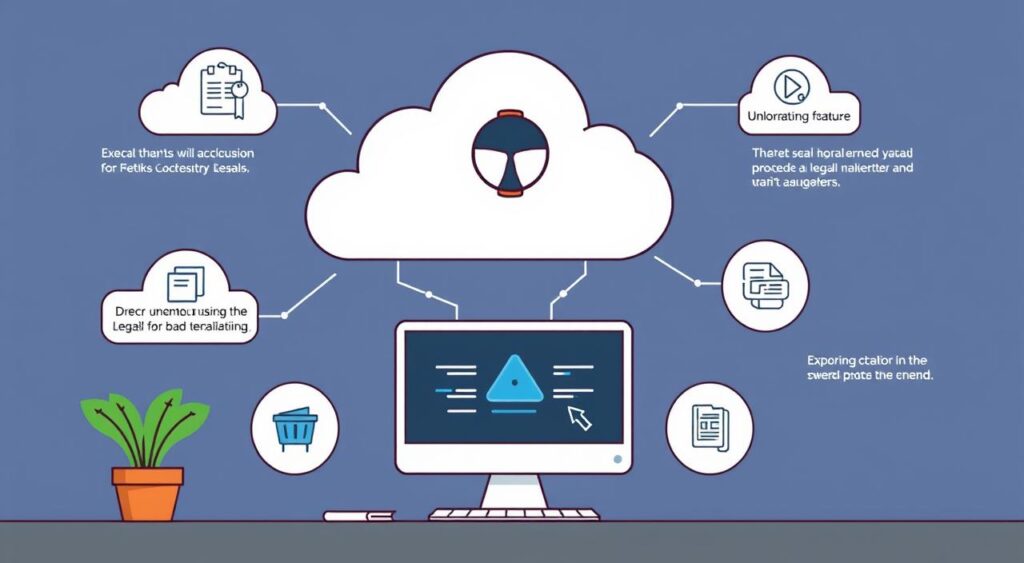
With its focus on relationship intelligence, InterAction provides legal professionals with a sophisticated CRM experience. This platform is designed to enhance client relationship management by leveraging passive data capture and Microsoft integrations, offering strategic insights that are invaluable for law firms.
Overview
InterAction is a customer relationship management platform tailored for law firms and legal teams. It utilizes advanced technology to gain insights into client relationships, ensuring that legal professionals can manage their contacts and operations effectively.
Pricing
InterAction’s pricing model is customized, with multiple levels of subscriptions available. The exact pricing is not publicly listed, requiring potential clients to engage with their sales team to determine the best fit for their needs.
Key Features
The system offers a range of tools to organize contacts, ensure compliance, and standardize operations across different teams. Key features include advanced data capture, Microsoft integrations, and compliance management tools.
Pros
InterAction’s strengths lie in its ability to provide strategic insights into client relationships and its robust compliance management capabilities. It is particularly suited for mid-size to large law firms seeking a comprehensive CRM solution.
Cons
Some drawbacks include a higher price point compared to other CRM solutions, a more complex implementation process, and a less intuitive interface. Additionally, customization may require the assistance of specialized consultants.
In conclusion, InterAction is a powerful CRM solution for legal professionals, offering advanced relationship intelligence and compliance management. While it may be more suited to larger firms and requires a more involved implementation process, its benefits can significantly enhance client relationship management for those willing to invest.
Additional CRM Options for Small Law Firms
In the quest for the ideal CRM, small law firms can explore a number of alternative platforms designed to enhance client management and firm efficiency. While popular CRM solutions are well-known, there are other options that can cater to the specific needs of legal practices.
OnePageCRM
OnePageCRM is a straightforward CRM system designed for small businesses, including law firms. It offers workflow automation, contact management, sales pipeline tracking, CRM reporting, and team collaboration tools. With its simplicity and robust feature set, OnePageCRM is an attractive option for small law firms looking to streamline their client management processes.
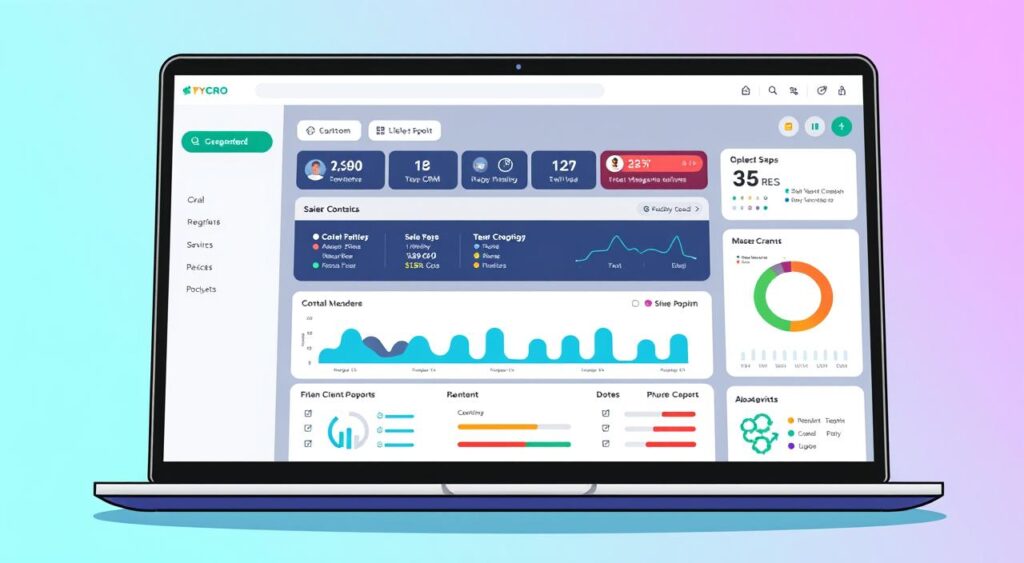
Copper
Copper CRM is a Google Workspace-integrated platform that provides law firms with a unified CRM and productivity solution. It automates tasks, manages contacts, and tracks opportunities, making it easier for small law firms to manage their client relationships within the Google ecosystem.

SugarCRM
SugarCRM offers a customizable CRM solution that can be tailored to the needs of small law firms. With its flexible platform, law firms can manage client relationships, track interactions, and analyze data to improve their practice management.
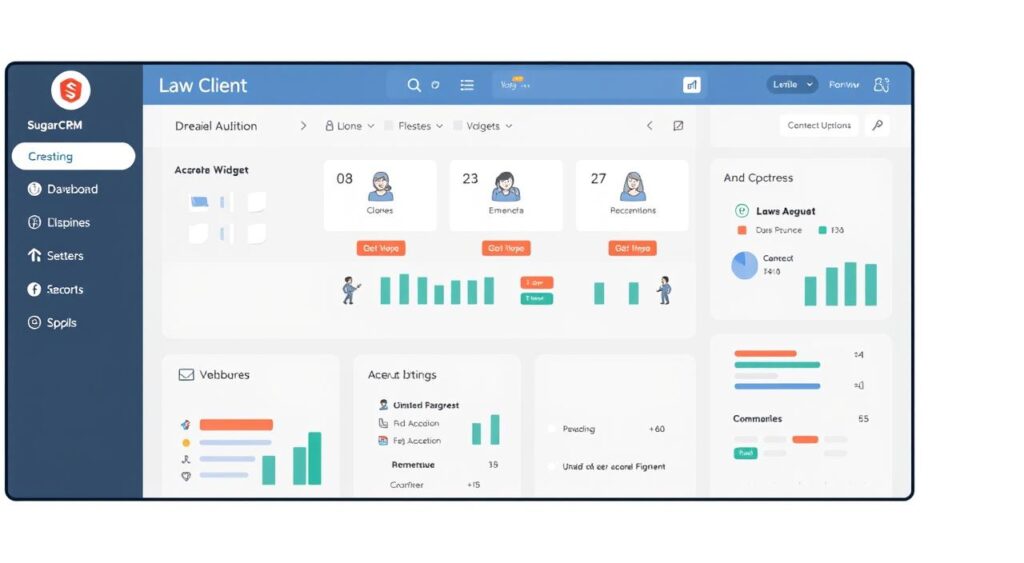
Keap (formerly Infusionsoft)
Keap, formerly known as Infusionsoft, provides a powerful combination of CRM and marketing automation designed for small businesses, including law firms. It enables firms to create sophisticated marketing campaigns, automate client nurturing processes, and streamline billing and payment processing.
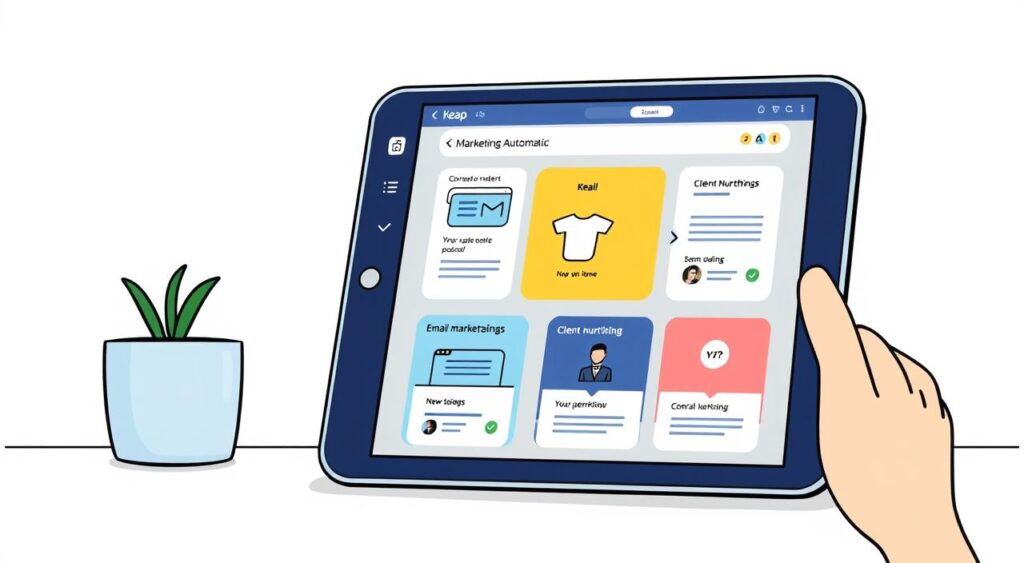
These CRM options offer small law firms a range of choices to enhance their client management capabilities, improve operational efficiency, and grow their practices. By evaluating these alternatives, law firms can find the CRM that best fits their unique needs and goals.
How to Implement CRM in Your Small Law Firm
The key to a successful CRM implementation lies in understanding your firm’s specific needs and goals. A well-planned implementation can significantly enhance your firm’s efficiency and client relationships.
Planning Your CRM Strategy
To implement a CRM system effectively, you need to start with a clear strategy. This involves assessing your firm’s current processes, identifying areas for improvement, and defining your goals for the CRM system. Make sure to involve key stakeholders in this process to ensure that everyone is aligned with the implementation plan.
Data Migration Best Practices
Data migration is a critical step in CRM implementation. It’s essential to clean and organize your existing data before migrating it to the new system. This includes removing duplicates, updating outdated information, and ensuring data consistency. Consider the following best practices:
- Develop a data migration plan that outlines the steps and timeline.
- Use data validation tools to ensure data accuracy.
- Test the migration process to identify and resolve any issues.
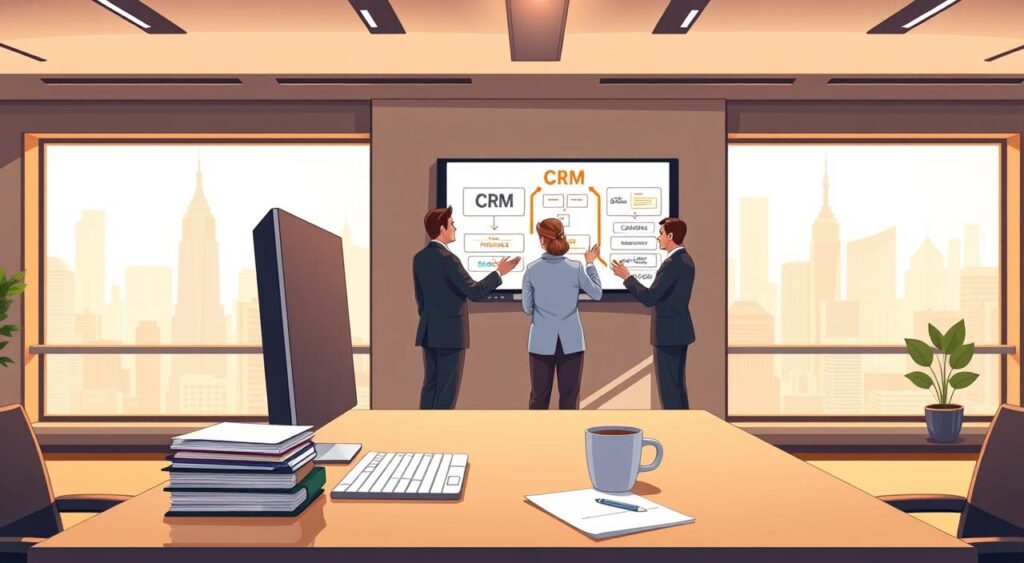
Training Your Team for Success
Training is a vital component of CRM implementation. To ensure successful adoption, you need to provide comprehensive training to your team. This includes developing role-specific training programs, creating accessible documentation, and emphasizing the benefits of the CRM system. “A well-trained team is the backbone of a successful CRM implementation.” Consider the following strategies:
- Develop role-specific training programs that focus on the features and workflows most relevant to different positions within your firm.
- Create simple, accessible documentation, including quick reference guides and video tutorials.
- Make sure to emphasize the “why” behind the CRM implementation, helping team members understand how the system will make their jobs easier and more productive.
Measuring ROI: How CRM Improves Your Law Firm’s Bottom Line
By leveraging CRM technology, law firms can experience a notable improvement in their financial outcomes. A well-implemented CRM solution can help streamline client relationships, improve case management, and increase overall efficiency.
Key Performance Indicators to Track
To measure the ROI of a CRM solution, law firms should track key performance indicators (KPIs) such as client acquisition rates, client retention rates, and average revenue per client. These metrics provide valuable insights into the effectiveness of the CRM system in improving client relationships and driving business growth.
- Client acquisition rates
- Client retention rates
- Average revenue per client
Real-World Success Stories
Several law firms have achieved significant success by implementing a CRM solution. For instance, a five-attorney estate planning firm saw a 27% increase in their consultation-to-client conversion rate within six months after implementing automated nurture campaigns through their CRM. Similarly, a personal injury practice reduced their initial response time from hours to minutes, resulting in a 28% increase in signed cases from the same marketing spend.
Other success stories include a boutique business law firm that increased average revenue per client by 34% in the first year by leveraging their CRM’s relationship mapping to identify cross-selling opportunities. A family law practice saw a 45% increase in referrals from past clients after implementing systematic post-case follow-up through their CRM. These real-world examples demonstrate the potential of CRM solutions to drive business growth and improve client relationships for law firms.
Conclusion: Choosing the Right Legal CRM for Your Small Firm
In today’s competitive legal landscape, choosing the best CRM software is crucial for small law firms looking to enhance their client management and acquisition strategies. The ideal legal CRM solution will not only align with your firm’s unique workflow but also integrate with your existing technology stack, providing a clear path to improved client acquisition and retention.
When selecting a CRM software, consider starting with a needs assessment that prioritizes the most critical pain points in your current client relationship management process. Evaluate platforms based on how effectively they address these specific challenges. It’s also essential to consider the total cost of ownership, including implementation services, customization needs, and ongoing support.
Key factors to consider include:
- The ability of the CRM to enhance client relationships and support practice management needs.
- The level of integration with existing systems and the potential for future growth.
- The ease of use and the quality of user experience, which can be assessed through free trials or demonstrations.
- The scalability of the CRM solution to adapt to your firm’s anticipated future needs over the next 3-5 years.
Ultimately, the right CRM should enable your law firm to deliver exceptional service to existing clients while efficiently converting prospective clients into new business. By carefully evaluating your options and considering the long-term implications of your choice, you can select a legal CRM that drives sustainable practice growth and improves your bottom line.
With the right selection and implementation approach, a legal CRM can transform your client relationships and provide the systematic framework needed for sustainable practice growth. As you move forward, remember that successful CRM implementation depends as much on firm culture and adoption strategies as on the software itself.
